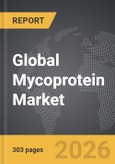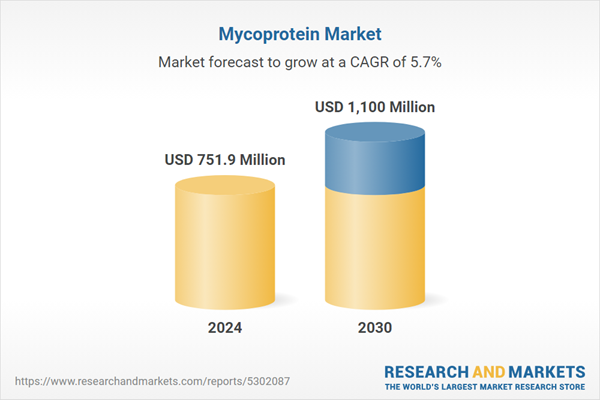Global Mycoprotein Market - Key Trends and Drivers Summarized
What Is Mycoprotein and How Is It Produced?
Mycoprotein is a protein-rich food ingredient derived from fungi, specifically a naturally occurring fungus known as Fusarium venenatum. It is primarily known for its use in meat substitutes and plant-based products, making it an essential component of the growing alternative protein market. The production of mycoprotein involves a fermentation process similar to that used in brewing or making yogurt. The fungus is grown in large fermentation tanks, where it is fed with glucose (derived from renewable plant sources) along with essential nutrients such as minerals and vitamins. Under controlled conditions, the fungus rapidly multiplies, producing a high-quality, fibrous protein that closely mimics the texture and taste of meat. Once harvested, the mycoprotein is processed by removing excess moisture, which results in a protein-dense material that can be flavored, shaped, and cooked in a variety of ways. Mycoprotein's appeal lies in its ability to provide a complete protein source that contains all essential amino acids while being low in fat and high in fiber, making it a popular choice for consumers seeking sustainable, healthy alternatives to animal-based proteins.What Nutritional and Environmental Benefits Does Mycoprotein Offer?
Mycoprotein has become increasingly popular not only for its nutritional profile but also for its positive environmental impact. From a nutritional standpoint, mycoprotein is a complete protein, meaning it contains all the essential amino acids required by the human body, making it comparable to meat, eggs, and dairy in terms of protein quality. Additionally, mycoprotein is low in saturated fat, high in fiber, and cholesterol-free, making it an attractive option for those looking to manage heart health or reduce fat intake. Studies have shown that the high fiber content of mycoprotein can help promote gut health and regulate blood sugar levels, which are crucial for managing conditions such as diabetes and maintaining overall digestive health. On the environmental side, mycoprotein production is far more sustainable than traditional livestock farming. Growing mycoprotein requires significantly less land, water, and energy than raising animals for meat. The fermentation process emits substantially fewer greenhouse gases compared to the methane-heavy livestock industry. Furthermore, mycoprotein can be produced year-round in controlled conditions, independent of seasons or weather, providing a more reliable and scalable source of protein to meet the world's growing food demands. As the global population rises and the environmental impact of meat production becomes a more pressing issue, mycoprotein offers a viable and sustainable alternative that can help address both health and environmental concerns.How Is Mycoprotein Changing the Food Industry and Consumer Preferences?
Mycoprotein is reshaping the food industry by offering a high-quality meat alternative that appeals to a broad range of consumers, from vegetarians and vegans to flexitarians and meat-eaters looking to reduce their meat consumption. The texture and versatility of mycoprotein allow it to closely mimic the mouthfeel and culinary experience of meat, making it a favored ingredient in plant-based products like burgers, sausages, and nuggets. One of the most well-known brands using mycoprotein is Quorn, which has introduced a wide range of meat-free products that have gained popularity worldwide. The growing demand for plant-based diets, driven by health consciousness, environmental concerns, and ethical considerations, has opened up a significant market for mycoprotein-based foods. Unlike many other plant-based proteins like soy or pea, mycoprotein offers a naturally meat-like texture without the need for extensive processing or additives, giving it a competitive edge in the alternative protein market. Consumer preferences are shifting, with many people actively seeking to reduce their consumption of animal products while still desiring familiar and satisfying eating experiences. Mycoprotein meets this demand by delivering a product that closely replicates the sensory attributes of meat without the associated health and environmental drawbacks. Additionally, as concerns about food allergies and intolerances rise, mycoprotein offers a hypoallergenic alternative to common allergens such as soy and gluten, making it accessible to a wider range of consumers. The food service industry has also embraced mycoprotein, with restaurants and fast-food chains increasingly incorporating it into their menus as part of their push to offer more sustainable and health-conscious meal options.What Factors Are Propelling Growth in the Mycoprotein Market?
The growth in the mycoprotein market is driven by several critical factors, each of which is contributing to its increasing prominence in the global food landscape. One of the primary drivers is the rising consumer demand for plant-based proteins, fueled by growing awareness of the health and environmental impacts of meat consumption. As more people seek to adopt flexitarian, vegetarian, or vegan diets, mycoprotein offers an attractive alternative that provides the taste and texture of meat without the associated health risks, such as high cholesterol and saturated fats, making it a popular choice for health-conscious consumers. Another important driver is the shift towards sustainability in food production. The environmental benefits of mycoprotein - its low resource use, minimal carbon footprint, and ability to be produced in controlled environments year-round - are becoming increasingly important as global awareness of climate change and resource depletion grows. This makes mycoprotein an appealing option for consumers who prioritize environmental responsibility in their food choices. Technological advancements in food production and processing are also contributing to the growth of the mycoprotein market. Innovations in fermentation technology have improved the efficiency and scalability of mycoprotein production, enabling companies to meet the growing demand while maintaining quality and affordability. Additionally, the ongoing trend of product diversification in the alternative protein space is driving new product innovations, with mycoprotein being used in an expanding range of food products, from ready-to-eat meals to high-protein snacks. Regulatory support and increasing investment in sustainable food technologies are further propelling the market, with governments and venture capitalists recognizing the potential of mycoprotein to address global food security and sustainability challenges. Lastly, consumer preference for clean-label foods - products with simple, natural ingredients - is aligning with mycoprotein's minimal processing and natural production process, making it a favored choice among consumers seeking healthy, sustainable, and ethical food options. These trends are set to fuel continued growth in the mycoprotein market, making it a cornerstone of the future global protein supply.Report Scope
The report analyzes the Mycoprotein market, presented in terms of market value (US$ Thousand). The analysis covers the key segments and geographic regions outlined below.- Segments: Application (Food & Beverage, Dietary Supplements, Other Applications).
- Geographic Regions/Countries:World; United States; Canada; Japan; China; Europe (France; Germany; Italy; United Kingdom; Spain; Russia; and Rest of Europe); Asia-Pacific (Australia; India; South Korea; and Rest of Asia-Pacific); Latin America (Argentina; Brazil; Mexico; and Rest of Latin America); Middle East (Iran; Israel; Saudi Arabia; United Arab Emirates; and Rest of Middle East); and Africa.
Key Insights:
- Market Growth: Understand the significant growth trajectory of the Food & Beverage Application segment, which is expected to reach US$523.4 Million by 2030 with a CAGR of a 5.6%. The Dietary Supplements Application segment is also set to grow at 6.5% CAGR over the analysis period.
Why You Should Buy This Report:
- Detailed Market Analysis: Access a thorough analysis of the Global Mycoprotein Market, covering all major geographic regions and market segments.
- Competitive Insights: Get an overview of the competitive landscape, including the market presence of major players across different geographies.
- Future Trends and Drivers: Understand the key trends and drivers shaping the future of the Global Mycoprotein Market.
- Actionable Insights: Benefit from actionable insights that can help you identify new revenue opportunities and make strategic business decisions.
Key Questions Answered:
- How is the Global Mycoprotein Market expected to evolve by 2030?
- What are the main drivers and restraints affecting the market?
- Which market segments will grow the most over the forecast period?
- How will market shares for different regions and segments change by 2030?
- Who are the leading players in the market, and what are their prospects?
Report Features:
- Comprehensive Market Data: Independent analysis of annual sales and market forecasts in US$ Million from 2024 to 2030.
- In-Depth Regional Analysis: Detailed insights into key markets, including the U.S., China, Japan, Canada, Europe, Asia-Pacific, Latin America, Middle East, and Africa.
- Company Profiles: Coverage of players such as 3F Bio Ltd, General Mills, Marlow Foods Ltd, MycoTechnology, Inc., Temasek Holdings and more.
- Complimentary Updates: Receive free report updates for one year to keep you informed of the latest market developments.
Some of the 162 companies featured in this Mycoprotein market report include:
- 3F Bio Ltd
- General Mills
- Marlow Foods Ltd
- MycoTechnology, Inc.
- Temasek Holdings
- Tyson Ventures
This edition integrates the latest global trade and economic shifts into comprehensive market analysis. Key updates include:
- Tariff and Trade Impact: Insights into global tariff negotiations across 180+ countries, with analysis of supply chain turbulence, sourcing disruptions, and geographic realignment. Special focus on 2025 as a pivotal year for trade tensions, including updated perspectives on the Trump-era tariffs.
- Adjusted Forecasts and Analytics: Revised global and regional market forecasts through 2030, incorporating tariff effects, economic uncertainty, and structural changes in globalization. Includes historical analysis from 2015 to 2023.
- Strategic Market Dynamics: Evaluation of revised market prospects, regional outlooks, and key economic indicators such as population and urbanization trends.
- Innovation & Technology Trends: Latest developments in product and process innovation, emerging technologies, and key industry drivers shaping the competitive landscape.
- Competitive Intelligence: Updated global market share estimates for 2025, competitive positioning of major players (Strong/Active/Niche/Trivial), and refined focus on leading global brands and core players.
- Expert Insight & Commentary: Strategic analysis from economists, trade experts, and domain specialists to contextualize market shifts and identify emerging opportunities.
Table of Contents
Companies Mentioned (Partial List)
A selection of companies mentioned in this report includes, but is not limited to:
- 3F Bio Ltd
- General Mills
- Marlow Foods Ltd
- MycoTechnology, Inc.
- Temasek Holdings
- Tyson Ventures
Table Information
| Report Attribute | Details |
|---|---|
| No. of Pages | 303 |
| Published | February 2026 |
| Forecast Period | 2024 - 2030 |
| Estimated Market Value ( USD | $ 751.9 Million |
| Forecasted Market Value ( USD | $ 1100 Million |
| Compound Annual Growth Rate | 5.7% |
| Regions Covered | Global |









